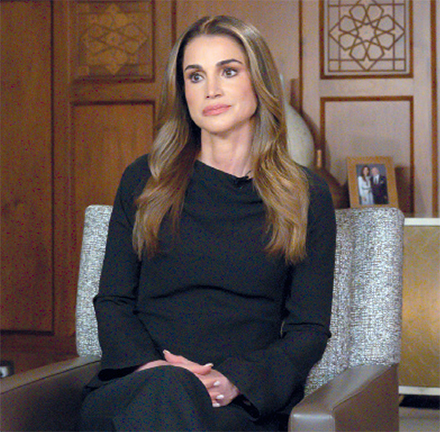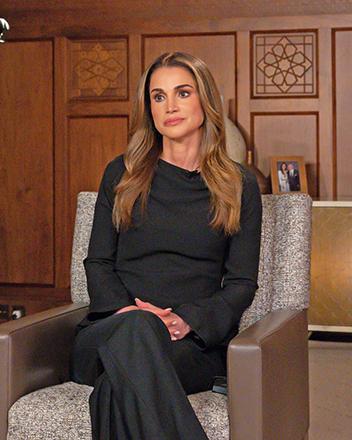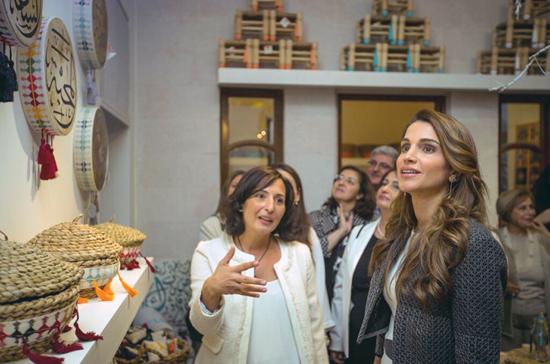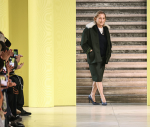You are here
Queen Rania’s CNN interview sparks praise for bold advocacy on Gaza, Palestinian rights
By Rana Husseini - Oct 27,2023 - Last updated at Oct 27,2023

AMMAN — Former officials and experts on Thursday expressed pride and respect for Her Majesty Queen Rania’s interview with CNN, saying it was “bold and powerful”.
In a live interview with CNN’s Christiane Amanpour on Tuesday, Queen Rania relayed the Arab World’s shock and disappointment at the world’s “glaring double standard” and “deafening silence” in the face of Israel’s ongoing war on the Gaza Strip, emphasising that, despite the prevalent Western media narrative, “this conflict did not begin on October 7th”.
“Most networks are covering the story under the title of ‘Israel at War’. But for many Palestinians on the other side of the separation wall and the barbed wire, war has never left. This is a 75-year-old story; a story of overwhelming death and displacement to the Palestinian people,” Her Majesty said.
“The context of a nuclear-armed regional superpower that occupies, oppresses and commits daily documented crimes against Palestinians is missing from the narrative,” the Queen said in the interview that was conducted remotely from Her Majesty’s offices in Amman.
Former Minister Reem Abu Hassan said that Her Majesty’s command of the information, eloquenceand use of accurate facts together with her passion as a mother had a powerful remarkable impact on viewers by describing the injustice felt towards the horrific awful situation in the Gaza Strip.
Her Majesty kept her ground and never wavered with sound international legal arguments and articulate direct manner of response, Abu Hassan told The Jordan Times.
“The interview is exemplary in expressing our position as Jordanians, Arabs and Muslims in dealing with this most horrific human suffering,” Abu Hassan added.
Queen Rania’s interview got good press in the Western world where biases towards Israel are prevalent, according to Abu Hassan.
“The interview opened eyes and ears by expressing the dismay our part of the world feels about this “glaring double standard” approach and wittingly brought into the dialogue “the Palestinians’ right of self defence”, Abu Hassan stressed.
Her Majesty explained in the CNN interview that the people of Jordan are united in “grief, pain, and shock” in response to the staggering civilian casualties of the past 18 days of war.
“We’ve seen Palestinian mothers who have had to write the names of their children on their hands, because the chances of them being shelled to death — of their bodies turning into corpses — are so high,” Queen Rania said. “I just want to remind the world that Palestinian mothers love their children just as much as any other mother in the world. And for them to have to go through this, it’s just unbelievable.”
Former minister of state for media affairs Mohammad Momani added that Queen Rania’s interview with CNN was “exceptionally distinguished”.
The interview signalled a great deal of courage and decisiveness because “the Queen chose to stand on the wave of the international media narratives and to put through the Arab and Muslim narrative,” Momani told The Jordan Times.
He also stated that “it was so amazing to see the Queen so comfortable with herself when arguing her points”.
“This is a reflection of how deeply convinced that she is on the right side of history by defending human values and the rights of hopeless Palestinians against the killing that is targeting them,” Momani said.
The minister also pointed out that “someone with Queen Rania’s international status, reputation and credibility has created a discussion within international circles about the humanity of the Palestinians and Arabs, the double standards, ugliness, the rights of human beings to access accurate information and to avoid disinformation and Western media manipulation”.
Conveying Jordan’s position, Her Majesty stated that the country has been very clear that it condemns the killing of any civilian, whether Palestinian or Israeli. “That is Jordan’s ethical, moral position. And it’s also the position of Islam,” she said, explaining that the religion prohibits Muslims from killing a woman, child, or elderly person, destroying a tree or hurting a priest.
The Queen stressed that these rules of engagement should apply to all sides, arguing that Israel is committing atrocities under the guise of self-defence.
“6,000 civilians killed so far, 2,400 children — how is that self-defence? We are seeing butchery at a mass scale using precision weapons,” she said, “For the past two weeks, we have seen the indiscriminate bombardment of Gaza: Entire families wiped out, residential neighbourhoods flattened to the ground, the targeting of hospitals, schools, churches, mosques, medical workers, journalists, UN aid workers — how is that self defence?”
Former MP and Secretary General of the Jordanian People’s Democratic Party Abla Abu Olbeh said the Queen’s answers were political in their content and highlighted the Western discrimination regarding the rights of Palestinians.
“The Queen simply answered the Western world with their own logic,” Abu Olbeh pointed out.
Abu Olbeh told The Jordan Times that Queen Rania used her “valuable experience with the Western world to convey a human rights angle that gave a true picture of the suffering of people in Palestine”.
“The Queen conveyed many important messages, especially the fact that Palestinian people have the right to live like anyone else in this world,” Abu Olbeh said.
The Queen went on to state in the interview that many in the region view the Western world as complicit in this war through the support and cover that it provides Israel. “This is the first time in modern history that there is such human suffering and the world is not even calling for a ceasefire,” Her Majesty said. “Many in the Arab world are looking at the Western world as not just tolerating this, but as aiding and abetting it.”
Criticising the role of the media in covering the current conflict, Queen Rania noted the double standard presented when Western interviewers demand that people representing the Palestinian side immediately issue condemnations, requiring them to “have their humanity cross-examined and present their moral credentials”.
“We don’t see Israeli officials being asked to condemn, and when they are, people are readily accepted by [claiming] ‘our right to defend ourselves’,” she said. “I have never seen a Western official say the sentence: Palestinians have the right to defend themselves.”
“Freedom of speech is apparently a universal value, except when you mention Palestine,” Her Majesty said.
Director of the Phenix Centre for Economics and Informatics Studies (PCEIS) Ahmad Awad pointed out the importance of the interview’s content.
“The Queen focused on the image that is absent from the majority of the Western media, which influences the direction of the Western public’s opinion and policymakers,” Awad explained.
The Queen was clear in her message regarding the aspirations of the Palestinian people, including the right to defend themselves, their right to demand self-determination and to live freely and peacefully like the rest of the people of the world, Awad said.
“The Queen also emphasised what was stated in King Abdullah’s speech in Cairo a few days ago about the dangers of discrimination and double standards with regard to respecting the principles of human rights and international law,” Awad stated.
Awad told The Jordan Times that the Queen “invested her global presence in sending strong messages to construct our story and narrative correctly”.
“Queen Rania focused on the human dimension of the Palestinian tragedy that has been going on for decades, which I believe is the best approach to addressing Western public opinion, and therefore it was a distinctly political talk with a humanitarian content,” Awad stressed.
Related Articles
AMMAN – Her Majesty Queen Rania on Tuesday relayed the Arab World’s shock and disappointment at the world’s “glaring double standard” and “d
AMMAN — Senate President Faisal Fayez said that His Majesty King Abdullah, since the first day of the Israeli aggression on Gaza, has made w
AMMAN — Monday marks Her Majesty Queen Rania’s birthday. Over the past year, the Queen, an outspoken advocate for education in Jor

Opinion
Apr 09, 2025
Apr 08, 2025
- Popular
- Rated
- Commented
Apr 08, 2025
Apr 09, 2025
Newsletter
Get top stories and blog posts emailed to you each day.
















